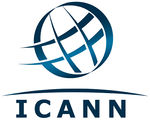ICANN
| Type: | Private, Non-Profit |
| Industry: | Internet Protocol Management |
| Founded: | 1998 |
| Headquarters: | 4676 Admiralty Way # 330, Marina del Rey, CA |
| Country: | International, USA |
| Employees: | 140 employees |
| Revenue: | 63.6 million (2010) |
| Website: | ICANN.org |
| Key People | |
| Peter Dengate Thrush Chair, Steve Crocker Vice Chair, | |
ICANN is an acronym for the Internet Corporation for Assigned Names and Numbers, a global multi-stakeholder organization that was created and empowered through actions by the U.S. government and its Department of Commerce.[1] It coordinates the Internet DNS, IP addresses and AS numbers; which involves a continued management of these evolving systems and the protocols that underly them.
While ICANN has its roots in the U.S. government, it is now, and continues to strive to be, a community driven, international organization. Their management of an interoperable Internet covers 180 million domain names, the allocation of more than 4 billion network addresses, and the support of a trillion odd DNS look-ups everyday across 240 countries.[2]
ICANN collaborates with companies, individuals, and governments to ensure the continued success of the Internet. It holds meetings three times a year, switching the international location for each meeting; one of these serves as the annual general meeting when the new ICANN board members take their seats.[3]
The Beginning
On July 1st, 1997, U.S. President Bill Clinton directed the Secretary of Commerce to privatize the management of the [[DNS]; which had heretofore been managed by the Defense Advanced Research Projects Agency (DARPA), the National Science Foundation (NSF) and other U.S. research agencies.[4] The goal was to open the Internet to greater international participation and support it as a new medium of commercial competition and exchange.[5]
The following day the Department of Commerce requested public input regarding DNS administration and structure, policy input regarding new registrars and the creation of new TLDs, and concerns regarding trademarks. More than 1,500 pages of comments were received.[6]
In January, 1998, an agency of the Department of Commerce (NTIA) issued what has become known as the "Green Paper". The document was a proposal which made clear that the agency intended to empower a non-profit entity to take control of the Internet and its DNS system.[7] The proposal drew criticism from some American lawmakers and other concerned individuals who saw the American fostered Internet about to be handed over to a Swiss entity.[8] The revised "White Paper" addressed some of those concerns but still posited the need for a Internet organization who could respect and foster stability, competition, bottom-up coordination, and international representation; while also establishing appropriate protocol and administrative mechanisms.[9] The "White Paper" did not clarify all of the divisive issues but instead called for the proposed entity to utilize its self-governance to decide the issues at hand.[10]
References
- ↑ ICANN DOC MoU
- ↑ ICANN Strategic Plan 2010
- ↑ ICANN About Meetings
- ↑ NTIA Green Paper
- ↑ ICANN DOC MoU
- ↑ NTIA
- ↑ ICANN White Paper
- ↑ http://www.icann.org/en/comments-mail/icann-current/msg00800.html ICANN Green Paper v. White Paper correspondence]
- ↑ Harvard Law Document
- ↑ ICANN Greev v. White Paper correspondence
